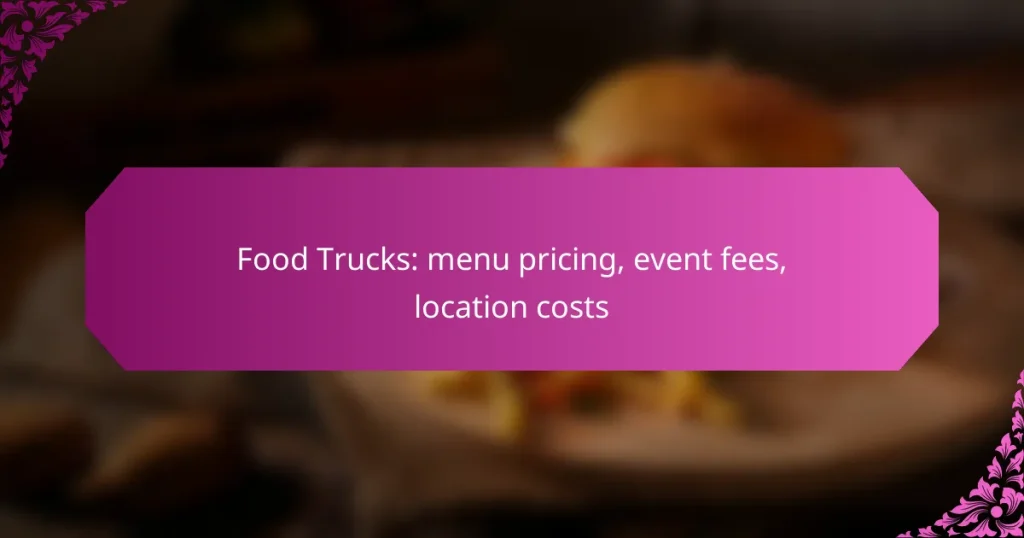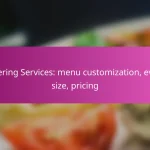Food trucks offer a diverse range of menu items in Canada, with prices typically ranging from CAD 10 to CAD 20, influenced by cuisine type and location. Additionally, event fees can vary widely, often costing from a few hundred to several thousand Canadian dollars, depending on the event specifics. Location costs also play a crucial role, as higher rental fees in popular areas can lead to increased menu prices to ensure profitability.
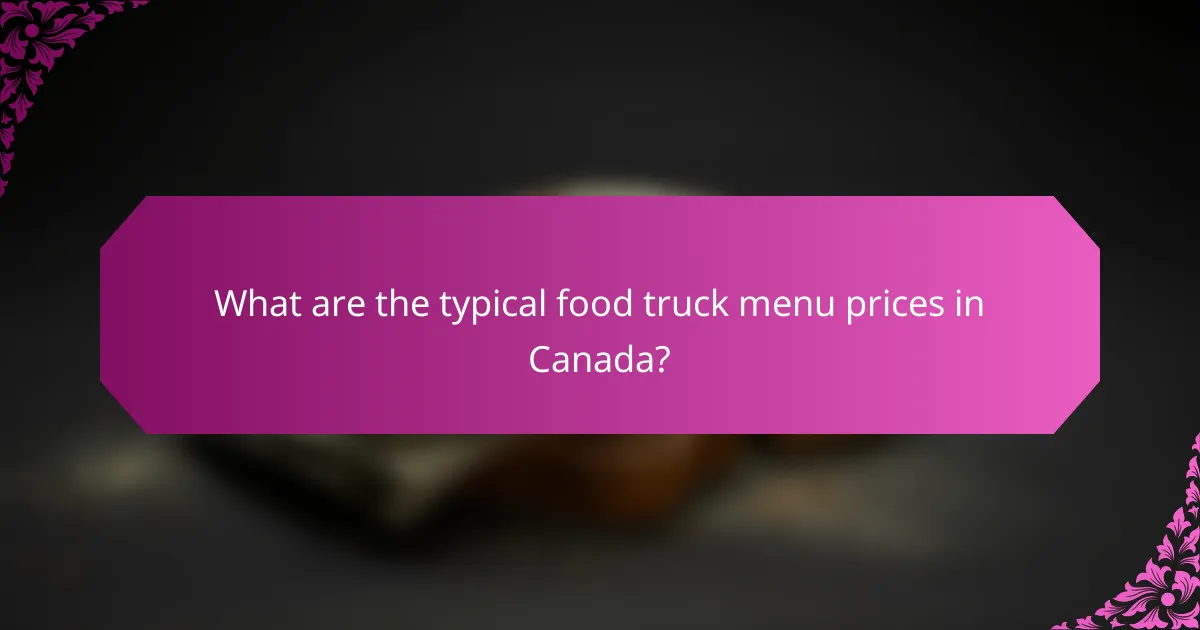
What are the typical food truck menu prices in Canada?
Food truck menu prices in Canada generally range from CAD 10 to CAD 20 per item, depending on the type of cuisine and location. Factors such as ingredient quality, preparation complexity, and local demand can influence these prices significantly.
Average price range for main dishes
The average price for main dishes from food trucks in Canada typically falls between CAD 10 and CAD 15. Some gourmet options or specialty items may reach CAD 20 or more, especially in urban areas or during popular events.
Street food staples like tacos, burgers, and poutine usually sit at the lower end of this range, while unique or artisanal offerings can command higher prices.
Popular menu items and their costs
Common food truck items include tacos, burgers, and sandwiches, with prices generally around CAD 10 to CAD 15. For example, a classic cheeseburger might cost CAD 12, while a gourmet taco could be priced at CAD 10 to CAD 14.
Other popular choices, such as gourmet grilled cheese or specialty fries, often range from CAD 8 to CAD 15, depending on toppings and ingredients used.
Factors affecting menu pricing
Location is another critical factor. Food trucks operating in high-traffic urban areas or at major events may set higher prices due to increased demand and operational costs. Seasonal variations and competition from other food vendors can further impact pricing strategies.
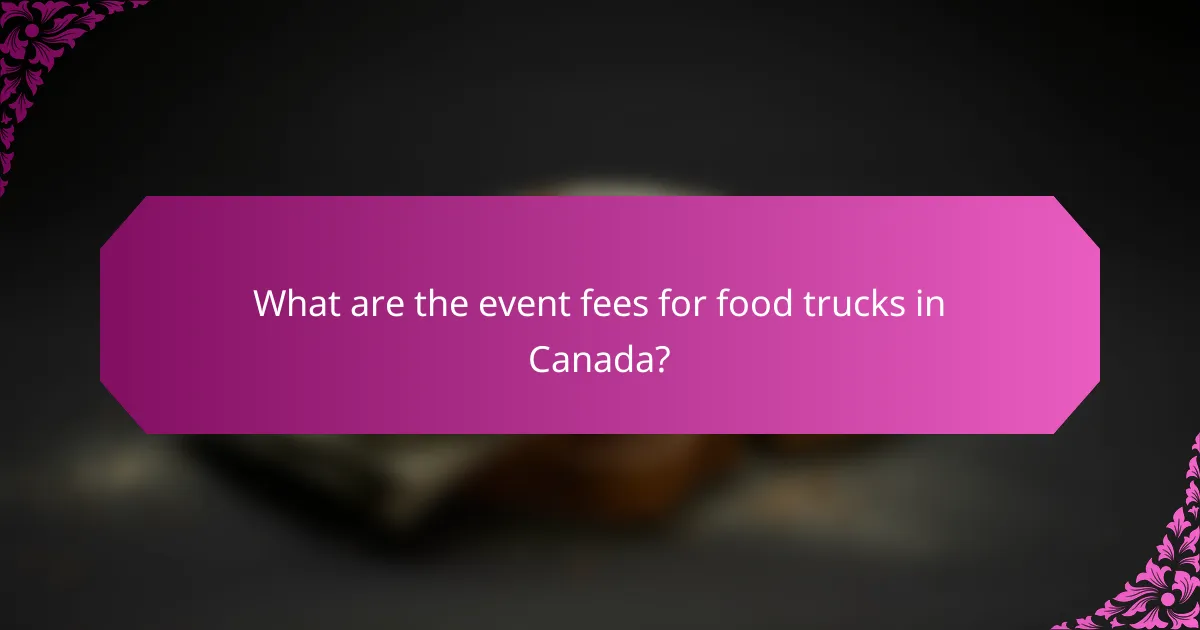
What are the event fees for food trucks in Canada?
Event fees for food trucks in Canada can vary significantly based on the type of event, location, and duration. Generally, these fees range from a few hundred to several thousand Canadian dollars, depending on the specifics of the engagement.
Standard event fee structures
Standard event fees for food trucks typically include a base charge that covers the truck’s presence and service for a set period. This base fee can range from CAD 500 to CAD 1,500 for events like weddings, corporate gatherings, or festivals.
Some food trucks may charge a flat rate for a specific number of guests, while others might offer tiered pricing based on the menu selections. It’s essential to clarify what the base fee includes, such as food, staff, and equipment.
Additional costs for special events
Special events, such as large festivals or private parties with unique themes, often incur additional costs. These may include fees for extra staff, specialized menu items, or unique equipment like tents and seating.
For instance, if a food truck is required to serve a large crowd or provide a customized menu, the total cost can increase by 20% to 50% compared to standard pricing. Always inquire about any potential surcharges when planning an event.
Deposit and cancellation policies
Most food trucks require a deposit to secure their services for an event, typically ranging from 20% to 50% of the total fee. This deposit is usually non-refundable, which helps cover any initial costs incurred by the vendor.
Cancellation policies can vary widely, so it’s crucial to review these terms before booking. Some food trucks may allow rescheduling without penalty if notified well in advance, while others may retain the deposit regardless of the cancellation timing.
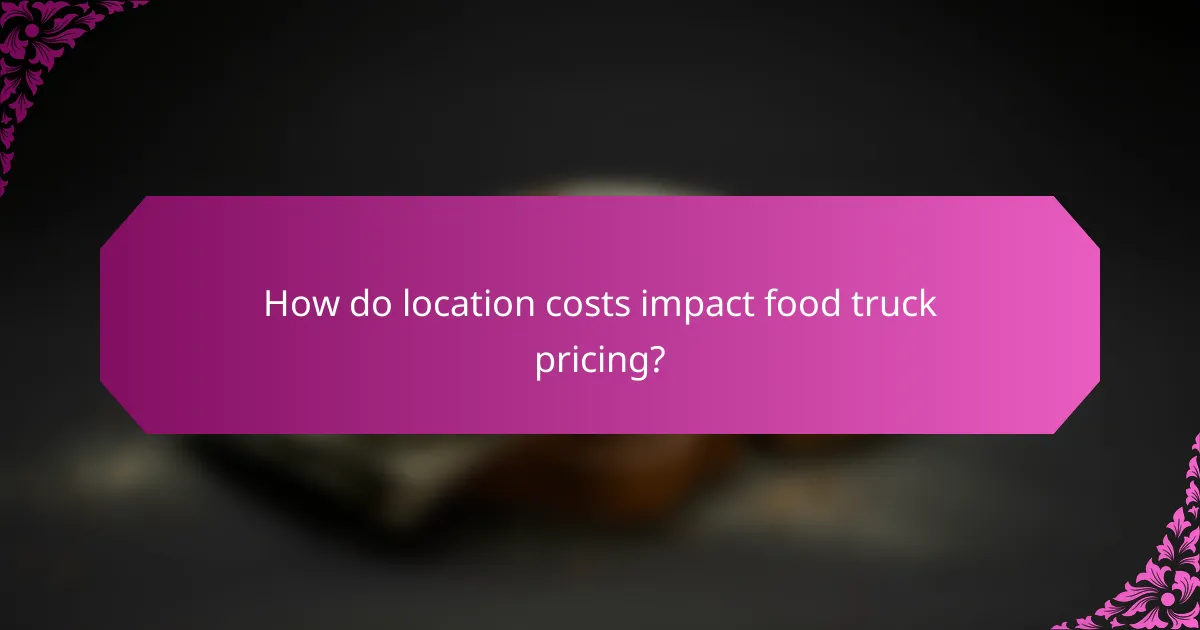
How do location costs impact food truck pricing?
Location costs significantly influence food truck pricing by affecting both overhead expenses and pricing strategies. Higher rental fees in prime areas can lead to increased menu prices to maintain profitability.
Common location rental fees
Location rental fees for food trucks can vary widely based on the area and type of event. Typically, fees range from around $50 to several hundred dollars per day. Some venues may charge a flat fee, while others might take a percentage of sales.
It’s essential to research local markets to understand the going rates. Some food trucks negotiate fees based on expected foot traffic or event size, which can help reduce costs.
High-demand areas and their costs
High-demand areas, such as downtown districts or popular event venues, often have elevated rental costs. In these locations, fees can reach up to $1,000 or more for a single day, especially during peak seasons or major events.
Food trucks operating in these areas may need to adjust their pricing to cover the higher costs. However, the potential for increased sales volume can offset these expenses, making it a viable option for many vendors.
Permits and licenses required
Operating a food truck typically requires various permits and licenses, which can add to location costs. Common requirements include health permits, business licenses, and specific permits for each location where the truck operates.
Costs for permits can range from a few dozen to several hundred dollars, depending on local regulations. It’s crucial for food truck operators to familiarize themselves with local laws to avoid fines and ensure compliance.
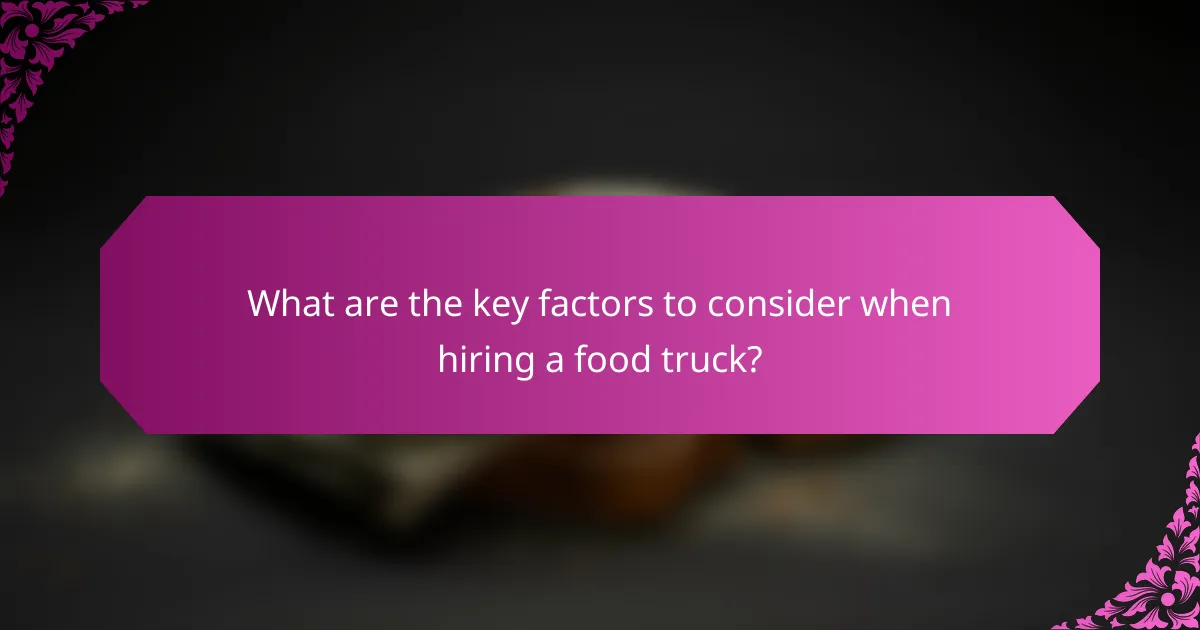
What are the key factors to consider when hiring a food truck?
When hiring a food truck, key factors include menu customization options, service quality, and the vendor’s response time and availability. Understanding these elements helps ensure a successful event and meets your specific needs.
Menu customization options
Menu customization is crucial for catering to diverse tastes and dietary restrictions. Many food trucks offer flexible menus that can include vegetarian, vegan, gluten-free, or allergen-free options. Discuss your requirements with the vendor to see how they can tailor their offerings.
Consider the pricing implications of menu customization. Some trucks may charge extra for specialized ingredients or unique dishes, while others might include these options in their standard pricing. It’s wise to clarify these details upfront to avoid surprises.
Service quality and reviews
Service quality can significantly impact the overall experience of your event. Look for food trucks with positive reviews and testimonials from previous clients. Online platforms and social media can provide insights into customer satisfaction and the truck’s reliability.
Ask for references or check review sites to gauge the consistency of service. A food truck that is known for friendly staff and efficient service will enhance your event, while poor service can lead to dissatisfaction among guests.
Response time and availability
Response time and availability are critical when planning your event. A food truck that responds quickly to inquiries and confirms availability promptly is more likely to be reliable. Aim to book well in advance, especially during peak seasons or popular event dates.
Establish clear communication with the vendor regarding their availability on your desired date and any potential backup plans. This ensures that you have a contingency if your first choice becomes unavailable, helping to keep your event on track.
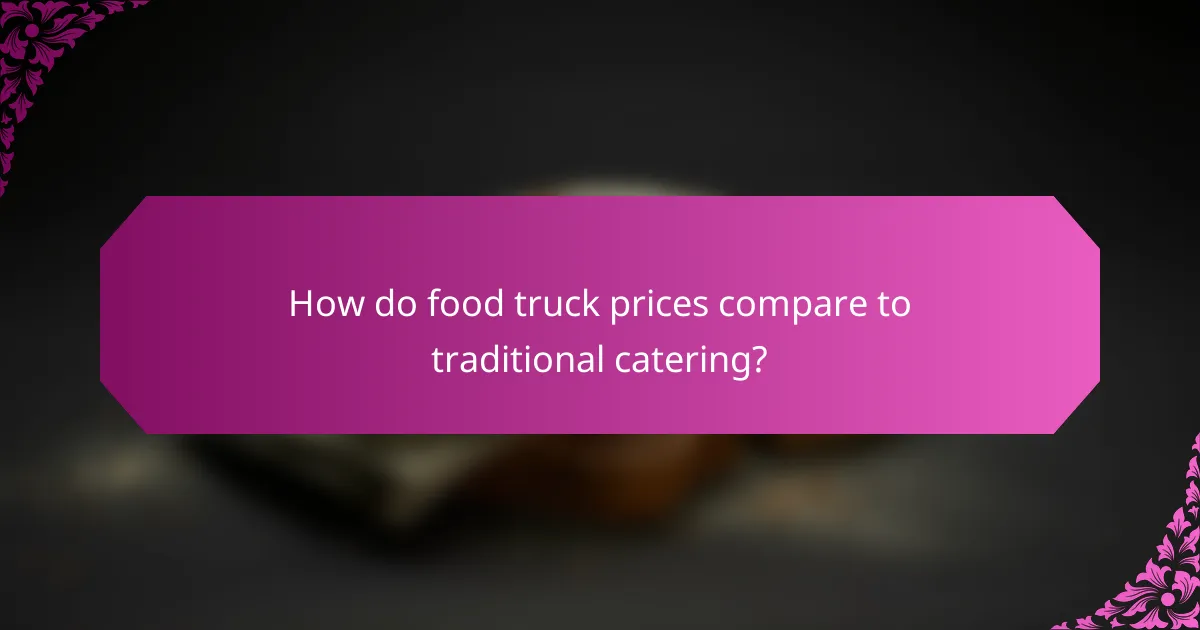
How do food truck prices compare to traditional catering?
Food truck prices often provide a more flexible and cost-effective alternative to traditional catering. While catering services typically charge a flat fee per person, food trucks may offer a pay-per-plate model, which can lead to savings, especially for smaller events.
Cost comparison for similar events
When comparing costs for similar events, food trucks can range from $10 to $30 per person, depending on the menu and location. Traditional catering, on the other hand, often starts at around $15 and can exceed $50 per person for more elaborate offerings. Additionally, food trucks may have lower overhead costs, allowing them to offer competitive pricing.
Consider also the additional fees associated with traditional catering, such as service charges, gratuities, and rental costs for equipment. Food trucks typically have fewer hidden fees, making it easier to budget for your event.
Benefits of choosing food trucks over catering
Choosing food trucks can enhance the overall experience of your event. They offer a unique and casual dining atmosphere that encourages guest interaction and can cater to diverse tastes with varied menu options. This flexibility allows for customization that traditional catering may not provide.
Moreover, food trucks often require less setup and cleanup time, allowing you to focus on enjoying the event rather than managing logistics. They can also be a fun visual element, attracting guests and creating a lively ambiance.

What are the emerging trends in the food truck industry?
The food truck industry is witnessing several emerging trends that reflect changing consumer preferences and technological advancements. Key trends include innovative menu offerings that cater to diverse dietary needs and the integration of technology to enhance customer experience and operational efficiency.
Innovative menu offerings
Food trucks are increasingly adopting creative and diverse menu offerings to attract a wider audience. This includes plant-based options, globally inspired cuisines, and gourmet twists on classic street food. For example, a food truck might serve vegan tacos or artisanal grilled cheese sandwiches made with specialty cheeses.
Additionally, seasonal and locally sourced ingredients are becoming popular, allowing food trucks to create unique dishes that change throughout the year. This not only supports local farmers but also appeals to consumers looking for fresh and sustainable dining options.
Technology integration in food trucks
Technology is playing a crucial role in the evolution of food trucks, with many operators utilizing mobile apps for ordering and payment. This streamlines the customer experience, reducing wait times and improving service efficiency. Some food trucks even offer contactless payment options, which have become increasingly important in recent years.
Moreover, social media platforms are essential for marketing food trucks, allowing them to engage with customers and announce their locations in real-time. Utilizing GPS tracking and online scheduling can help food trucks optimize their routes and maximize customer reach, ensuring they are where the demand is highest.
